When evaluating the best stock CFD brokers, we compared platforms based on several critical factors including regulatory compliance, trading costs, platform functionality, available stock markets, leverage options, and overall user experience.
We specifically analyzed each broker’s commission structures, spread offerings, available leverage ratios, number of tradeable stock CFDs, supported exchanges and countries, platform features, and regulatory oversight to provide you with a comprehensive comparison.
Find the 10 best Stock CFD Brokers in our top list table below:
Broker:
Stock CFDs:
Features:
Account:
Yes, 26,000+
(US, EU, UK, AUS, Asian Stock CFDs)
- No Minimum Deposit
- Spreads from 0.0 Pips
- 26,000+ Markets
- Leverage up to 1:500
- Low Commission from 2$/1 Lot
- High liquidity and fast execution
- TradingView, MT4/5, cTrader, Invest Account
- New Zealand regulated
Yes, 1,400+
(US, UK, EU, AUS, CAN, JPN Stock CFDs)
- ECN Accounts
- Spreads from 0.0 Pips
- Copy Trading available
- Leverage up to 1:500
- Low Commission from 1.5$/1 Lot
- High liquidity and fast execution
- TradingView, MT4/5, cTrader, Pro Trader
Yes, 10,000+
(US, UK, EU, AUS Stock CFDs)
- 5x regulated broker
- Spreads from 0.0 Pips
- More than 10,000 markets
- Leverage up to 1:500
- Low Commission from 3$/1 Lot
- High liquidity and fast execution
- TradingView, MT4/5, cTrader, IRRES
Yes, 12,000+
(US, UK, EU, AUS, JPN Stock CFDs)
- Different ECN Accounts
- Spreads from 0.0 Pips
- Copy Trading available
- Leverage up to 1:2000
- Low Commission from 6$/1 Lot
- High liquidity and fast execution
- MT4/MT5/RTrader/CopyFX
Yes, 1,200+
(US, UK, GER, AUS, and more Stock CFDs)
- ECN/STP Accounts
- Spreads from 0.0 Pips
- Leverage up to 1:1000
- Low Commission from 3$/1 Lot
- High liquidity and fast execution
- MT4/5 and Pro Trader
Yes, 850+
(US, UK, GER, FRA, AUS, JPN, HKG, SGP Stock CFDs)
- High Leverage up to 1:1000
- RAW ECN Spreads from 0.0 pips
- Fastest execution
- Attractive Bonus Programs
- Copy Trading
- MT4 / MT5
- Personal support 24/7
Yes, 2,100+
(US, UK, GER, AUS, JPN, HKG Stock CFDs)
- Mauritius-regulated broker
- High Leverage up to 1:1000
- Multiple account types
- More than 850 trading instruments
- MT4, MT5, PU Prime App
Yes, 1,800+
(US, UK, GER, FRA, AUS, JPN, CAN Stock CFDs)
- No Minimum Deposit
- Spreads from 0.0 Pips
- Leverage up to 1:500
- Low Commission from 4$/1 Lot
- 26,000+ Markets
- TradingView, MT4/5, cTrader
Yes, 1,300+
(US, UK, GER, FRA, AUS, JPN Stock CFDs)
- Spreads from 0.6 Pips
- Leverage up to 1:1000
- Over 1,000+ Markets
- Negative Balance Protection
- No Requotes & No Rejections
- MT4 & MT5 Platforms
- Regulated by CySEC, ASIC, FSC and DFSA
Yes, 2,400+
(US, UK, GER, FRA, AUS, JPN, Emerging Markets Stock CFDs)
- No Minimum Deposit
- Spreads from 0.0 Pips
- Leverage up to 1:3000
- Copy Trading Available
- Low Commission from 6$/1 Lot
- MT4/5 & FBS Trader
The Best 10 Stock CFD Brokers Compared:
A stock CFD (Contract for Difference) is a financial derivative that allows traders to speculate on share price movements without owning the underlying stocks, and choosing the right broker is essential for accessing competitive spreads, reliable execution, and comprehensive market coverage.
Explore the top 10 Stock CFD Brokers below:
- BlackBull Markets: for its competitive spreads, extensive range of assets, and sleek trading tools
- Vantage Markets: Offers low commissions and tight spreads on its RAW account, and a relatively sophisticated app
- FP Markets; Provides a feature-rich trading platform with access to a wide range of markets
- RoboForex: Features low spreads, a user-friendly app that nonetheless has ample sophisticated features for seasoned traders
- Moneta Markets: Combines a smart and intuitive app with innovative trading tools
- StarTrader: Delivers institutional-grade trading technology with competitive pricing and extensive market access.
- PU Prime: Offers premium trading conditions with tight spreads and professional-grade execution.
- VT Markets: Provides comprehensive trading solutions with strong regulatory backing and diverse asset offerings.
- XM: Features user-friendly platforms with educational resources and global market access.
- FBS: Combines competitive trading conditions with innovative tools and extensive market coverage.
1. BlackBull Markets
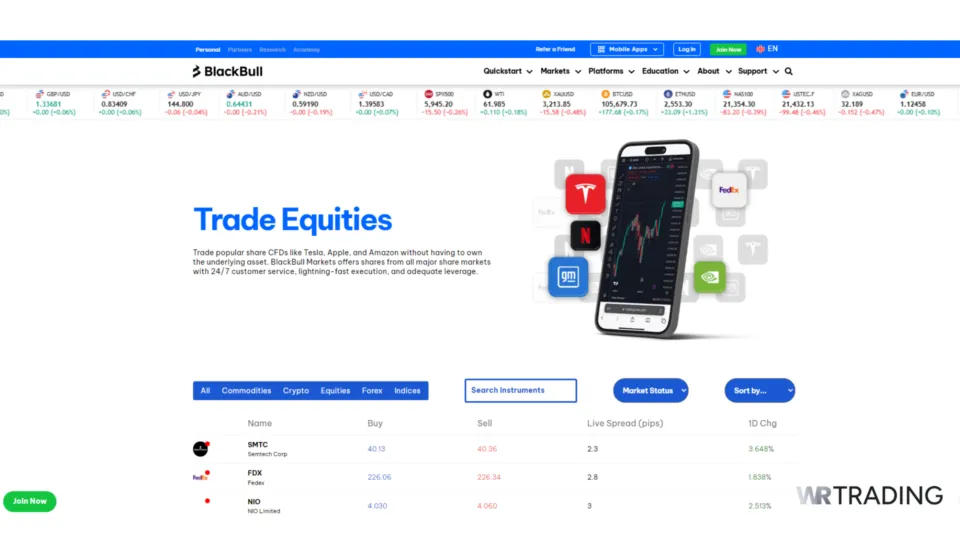
Established in New Zealand in 2014, BlackBull Markets is a well known forex and CFD brokerage with a reputation for sleek technology and great customer service. BlackBull Markets offers you an extensive range of assets, probably best known for forex, CFDs, and then commodities, indices, and equities.
We found this brokerage’s tight spreads and rapid execution speeds a real pleasure, and the fact that you also get MetaTrader 4/5, cTrader, and TradingView when you’re trading online or through its app makes life simpler.
BlackBull Markets features:
| Feature | Information |
|---|---|
| Stock CFD Exchanges/Countries | US, UK, Australia, Germany, France, Japan, Hong Kong, and other major global exchanges |
| Stock CFD Assets (how many) | Over 26,000 instruments (mostly share CFDs) |
| Stock CFD Leverage | Up to 1:500 |
| Minimum deposit | $0 |
| Spreads from | The BlackBull Prime Account lands at an all-in cost of 0.76 pips, but spreads start from 0.0 pips |
| Commissions | Their Standard Account has no commissions yet higher spreads (starting at 1.0 pips), while the Prime Account runs at $3 per side or $6 round turn per lot |
| Trading platforms | TradingView, cTrader, MetaTrader 5, MetaTrader 4, WebTrader, BlackBull CopyTrader, BlackBull Shares, BlackBull Trade, and ZuluTrade |
| Copy trading and algo trading | Yes |
| Support | 24/7 |
| Key features | Advanced charting tools, multiple account types, more than 26,000 instruments (mostly share CFDs) |
2. Vantage Markets
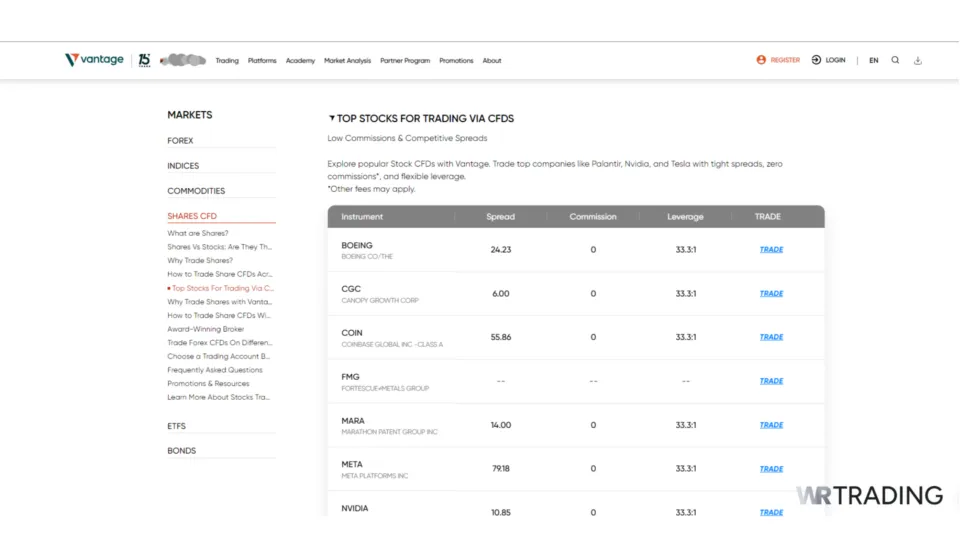
Many traders favor Vantage Markets for its RAW spread accounts and low commissions, and the Vantage Markets app boast a highly customizable interface with advanced analytics tools.
The brokerage appeals to both novice and experienced traders with a variety of account types, and share CFD traders enjoy competitive spreads on their favorite instrument.
In our experience, the broker backs up its great analytics that enable comprehensive market analysis with fast execution speeds, also facilitating MetaTrader 4 and 5 traders.
Vantage Markets features:
| Feature | Information |
|---|---|
| Stock CFD Exchanges/Countries | US, UK, Australia, Germany, France, Canada, Japan and other major exchanges |
| Stock CFD Assets (how many) | Over 1,400 stock CFDs on indices, stocks, commodities, and cryptos |
| Stock CFD Leverage | 500:1 |
| Minimum deposit | $50 |
| Spreads from | Standard Account from 1.0 pips, RAW and Pro accounts 0.0 |
| Commissions | $3 (round turn $6) |
| Trading platforms | Metatrader 4 and 5, ProTrader, and TradingView |
| Copy trading and algo trading | Yes |
| Support | 24/7 |
| Key features | Great economic calendar, custom indicators, over 1,400 stock CFDs on indices, stocks, commodities, and cryptos |
3. FP Markets
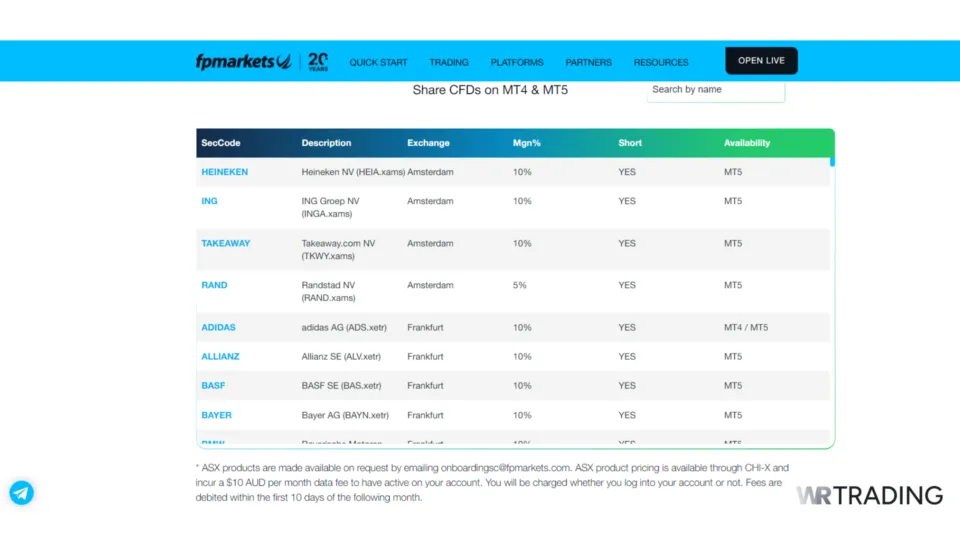
FP Markets offers you a wholesale trading platform with access to a pleasingly wide range of markets. Noted for its low spreads and comprehensive selection of assets, it’s seen as a venue of low trading costs and deep liquidity.
Moreover, FP Markets facilitates MetaTrader 4/5 traders, while providing you with advanced charting tools (and automated trading options) that we found very useful for certain trading strategies.
FP Markets features:
| Feature | Information |
|---|---|
| Stock CFD Exchanges/Countries | US, UK, Australia, Germany, France, Netherlands, Switzerland, and other major global markets |
| Stock CFD Assets (how many) | Over 10,000 stock CFDs |
| Stock CFD Leverage | Pro Account 500:1 |
| Minimum deposit | $50 |
| Spreads from | Variable, from around 0.5 pips |
| Commissions | Variable, per trade value or per share ($0.02 per share, with a minimum of $2), or between 0.06% and 0.30% per trade per side |
| Trading platform | Metatrader 4/5, cTrader, TradingView, Mobile Trading App, WebTrader |
| Copy trading and algo trading | Yes |
| Support | 24/7 |
| Key features | Integrated news feed, risk management tools, advanced order types, over 10,000 stock CFDs |
4. RoboForex
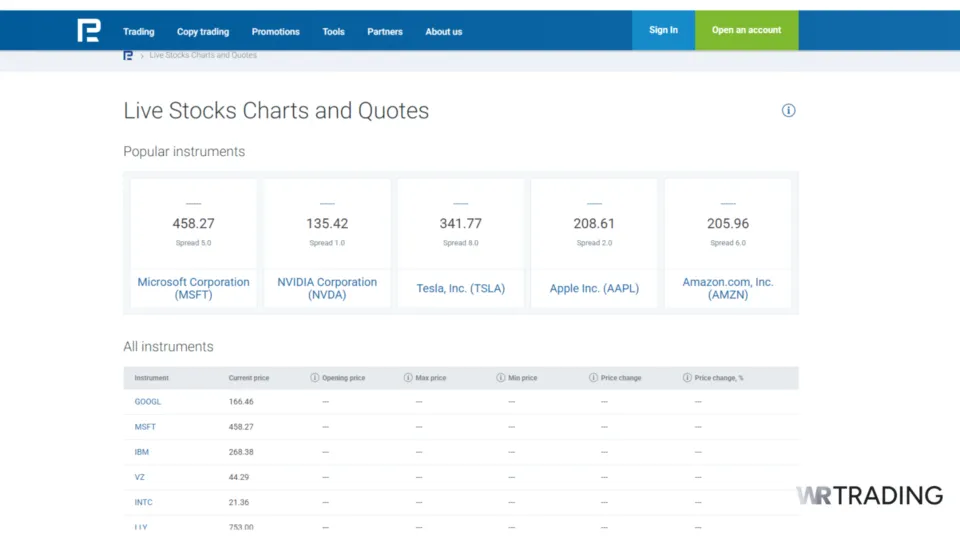
RoboForex is recognized for its low spreads and user-friendly trading app. The app offers advanced order types and a smooth trading experience, and is widely seen as a reliable and accessible trading platform by newcomers and seasoned traders alike.
The broker also stands out for its innovative trading tools and multiple platform offerings, including MetaTrader 4, MetaTrader 5, and cTrader.
We like this broker’s diverse range of stock CFDs with attractive leverage, and it has good support from traders looking for technological savvy and copy trading features to facilitate their approach to trading.
RoboForex features:
| Feature | Information |
|---|---|
| Stock CFD Exchanges/Countries | US, UK, Germany, France, Netherlands, Japan, Australia, and other major exchanges |
| Stock CFD Assets (how many) | Over 12,000 stock CFDs |
| Stock CFD Leverage | 1:2000 |
| Minimum deposit | $10 |
| Spreads from | Variable spreads on ECN Pro Account from 0.0 pips, Pro-Cent Account also variable spreads from 1.3 pips & no commission |
| Commissions | $0.02 per share with a minimum commission of $2 |
| Trading platform | MetaTrader 4/5, cTrader, R StocksTrader, R WebTrader |
| Copy trading and algo trading | Yes |
| Support | 24/7 |
| Key features | Copy trading, algorithmic trading, VPS support, over 12,000 stock CFDs |
5. Moneta Markets
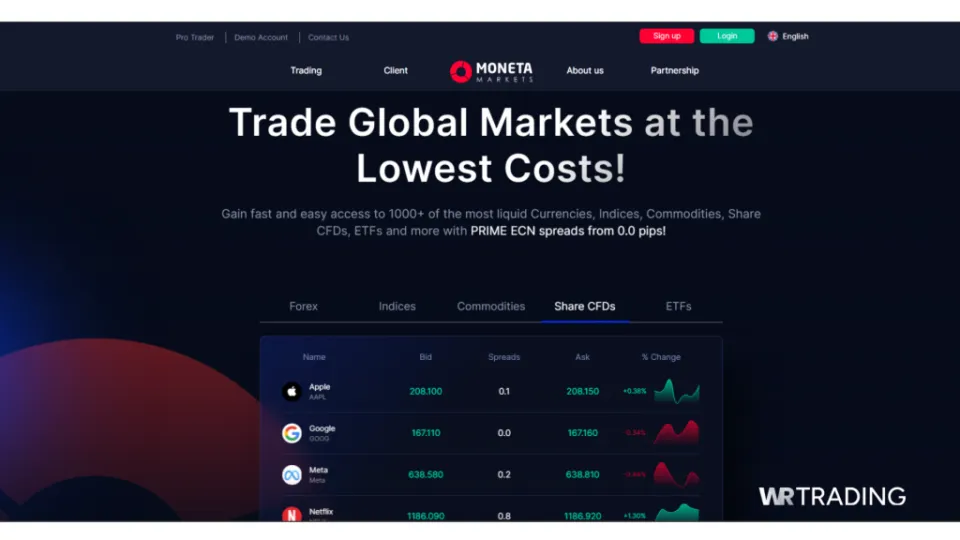
Moneta Markets is gaining a reputation for innovative trading tools backed by strong regulation. The broker’s educational resources are also pronounced, and the platform boasts a user-friendly interface.
With a focus on providing comprehensive educational material that instructs as traders learn the ropes, we feel the brokerage’s app is ideal for beginners looking to trade Share CFDs while still acquiring a feel for financial markets.
Moneta Markets also gives you access to the powerful MetaTrader 4 platform, offering the range of analytical tools and charting capabilities many traders prefer.
Moneta Markets features:
| Feature | Information |
|---|---|
| Stock CFD Exchanges/Countries | Australia, UK, US, Germany, and other major markets |
| Stock CFD Assets (how many) | Over 1,200 stock CFDs |
| Stock CFD Leverage | Moneta Markets offers leverage up to 1,000:1 on forex pairs and other instruments, but individual stock CFDs get 33:1 leverage maximum |
| Minimum deposit | $50 |
| Spreads from | You can glean spreads from 0.0 pips on Standard, Prime and ECN CFD accounts using MT4/5 |
| Commissions | Known for fairly high commissions, Moneta Markets’ commissions are based on account currencies and instruments – an AUD base currency account will pay a cheeky $18 when trading UK stock CFDs (per order per side), while the same account holder will pay a more reasonable $6 for AU stock CFDs (per order per side) |
| Trading platform | MetaTrader 4/5, ProTrader & AppTrader |
| Copy trading and algo trading | Yes, they offer Percentage Allocation Management Module (PAMM) accounts & their proprietary CopyTrader App, also ZuluTrade social trading integration |
| Support | 24/5 |
| Key features | Educational videos, strong market analysis, trading signals, over 1,200 stock CFDs |
6. StarTrader
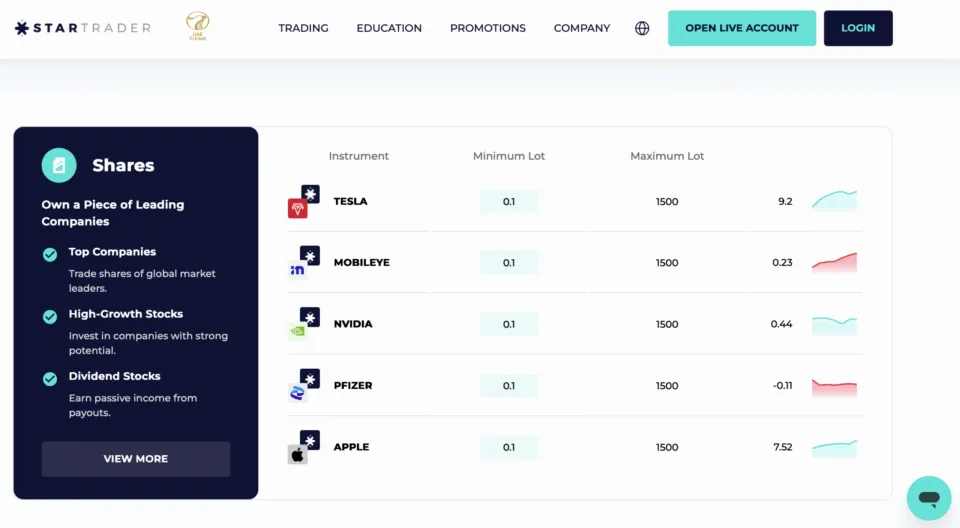
StarTrader has established itself as a premium brokerage offering institutional-grade trading technology combined with retail accessibility. The platform is particularly noted for its advanced execution algorithms and comprehensive market access, making it attractive to both professional and serious retail traders.
We like StarTrader’s commitment to transparency and competitive pricing, and this approach has earned it recognition among traders who prioritize execution quality and comprehensive market coverage.
StarTrader features:
| Feature | Information |
|---|---|
| Stock CFD Exchanges/Countries | US, UK, Australia, Germany, France, Japan, Hong Kong, Singapore |
| Stock CFD Assets (how many) | Over 850 stock CFDs |
| Stock CFD Leverage | Up to 1:400 |
| Minimum deposit | $100 |
| Spreads from | Raw spreads from 0.0 pips |
| Commissions | $3.50 per side ($7 round turn) |
| Trading platforms | MetaTrader 4/5, WebTrader, Mobile App |
| Copy trading and algo trading | Yes |
| Support | 24/7 |
| Key features | Institutional-grade execution, advanced analytics, risk management tools, over 8,500 stock CFDs |
7. PU Prime
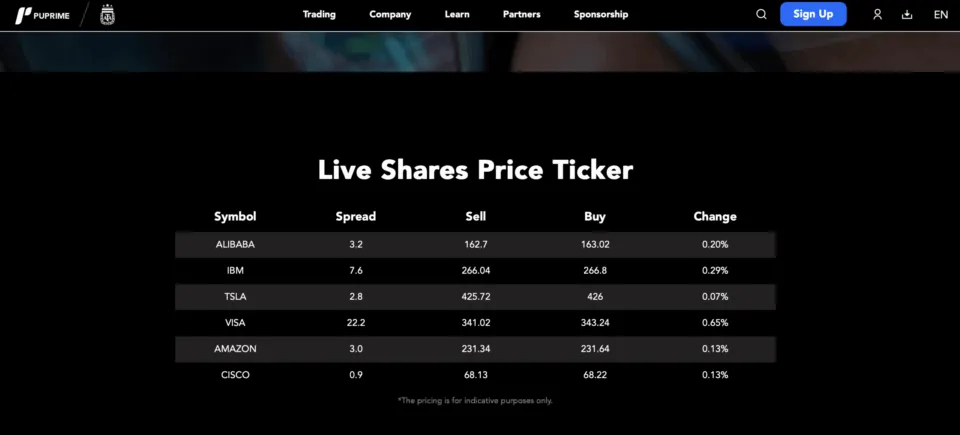
PU Prime positions itself as a premium broker offering professional-grade trading conditions with a focus on execution quality and customer service.
The broker has built a reputation for reliable execution and competitive spreads (which we found to be accurate), and this is particularly appealing to traders who require consistent performance across various market conditions.
We like the fact that PU Prime’s platform combines sophisticated trading tools with user-friendly interfaces, making it suitable for both experienced and developing traders.
PU Prime features:
| Feature | Information |
|---|---|
| Stock CFD Exchanges/Countries | US, UK, Germany, Australia, Japan, Hong Kong |
| Stock CFD Assets (how many) | Over 2,100 stock CFDs |
| Stock CFD Leverage | Up to 1:1000 |
| Minimum deposit | $20 |
| Spreads from | From 0.0 pips on Raw accounts |
| Commissions | $3.50 per lot per side |
| Trading platforms | MetaTrader 4/5, PU Prime WebTrader |
| Copy trading and algo trading | Yes |
| Support | 24/7 |
| Key features | Premium execution, advanced charting, market analysis tools, over 2,100 stock CFDs |
8. VT Markets
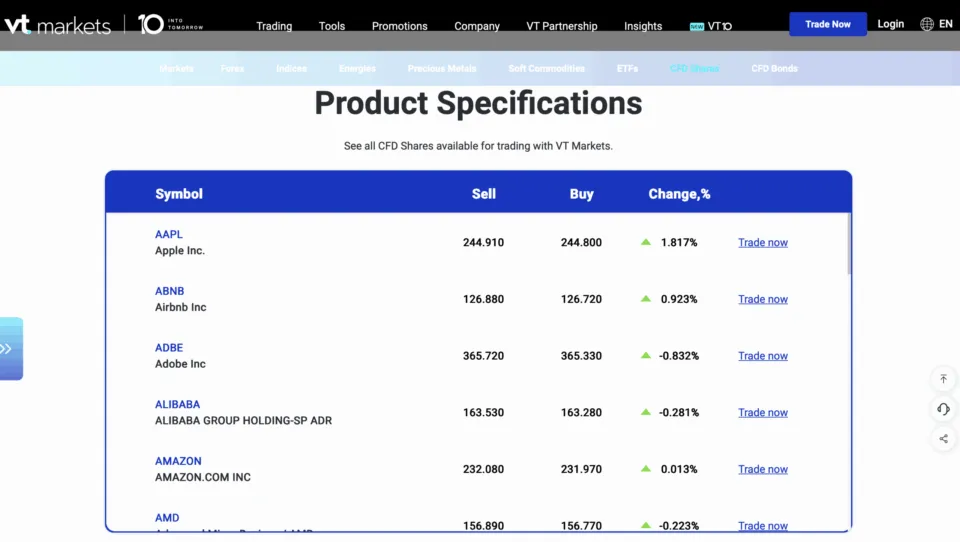
VT Markets has developed a strong reputation for providing comprehensive trading solutions backed by robust regulatory oversight. The broker offers a diverse range of trading instruments with competitive conditions, particularly known for its commitment to trader education and support.
We value VT Markets because it combines traditional MetaTrader platforms with innovative proprietary tools, and that gives us flexibility in our approach to market analysis and execution.
VT Markets features:
| Feature | Information |
|---|---|
| Stock CFD Exchanges/Countries | US, UK, Australia, Germany, France, Canada, Japan |
| Stock CFD Assets (how many) | Over 1,800 stock CFDs |
| Stock CFD Leverage | Up to 1:500 |
| Minimum deposit | $200 |
| Spreads from | From 0.0 pips on Raw accounts |
| Commissions | $3 per side ($6 round turn) |
| Trading platforms | MetaTrader 4/5, VT Markets App |
| Copy trading and algo trading | Yes |
| Support | 24/7 |
| Key features | Comprehensive market analysis, educational resources, risk management, over 1,800 stock CFDs |
9. XM
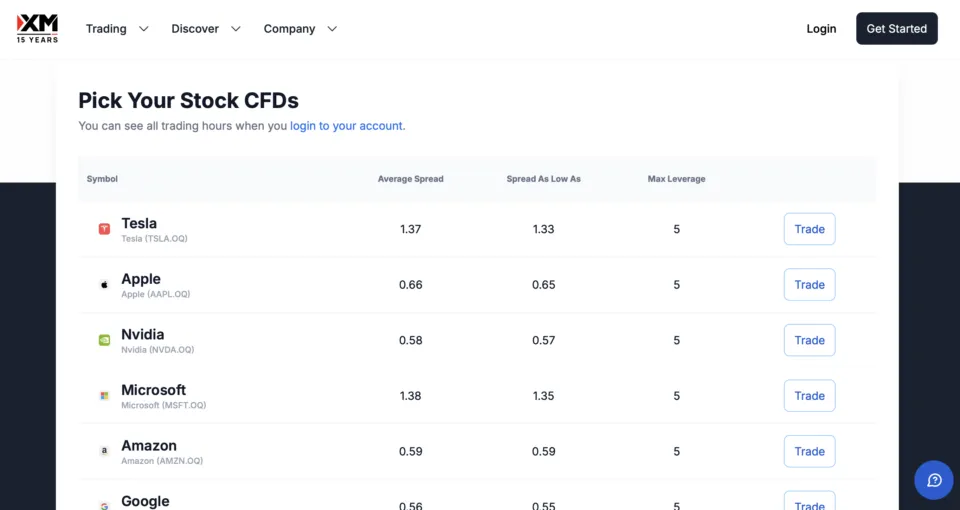
XM has established itself as a user-friendly broker with a strong emphasis on trader education and support.
The platform is particularly popular among newer traders due to its comprehensive educational resources and intuitive trading interfaces, something we found to be a legitimate improvement for newcomers starting to navigate financial trading.
XM combines accessibility with professional-grade tools, making it suitable for traders at various experience levels who want to access global stock markets through CFDs.
XM features:
| Feature | Information |
|---|---|
| Stock CFD Exchanges/Countries | US, UK, Germany, France, Australia, Japan |
| Stock CFD Assets (how many) | Over 1,300 stock CFDs |
| Stock CFD Leverage | Up to 1:888 |
| Minimum deposit | $5 |
| Spreads from | From 0.6 pips |
| Commissions | Commission-free on Standard accounts, $3.50 per side on Zero accounts |
| Trading platforms | MetaTrader 4/5, XM WebTrader |
| Copy trading and algo trading | Yes |
| Support | 24/7 |
| Key features | Educational resources, market analysis, user-friendly interface, over 1,300 stock CFDs |
10. FBS
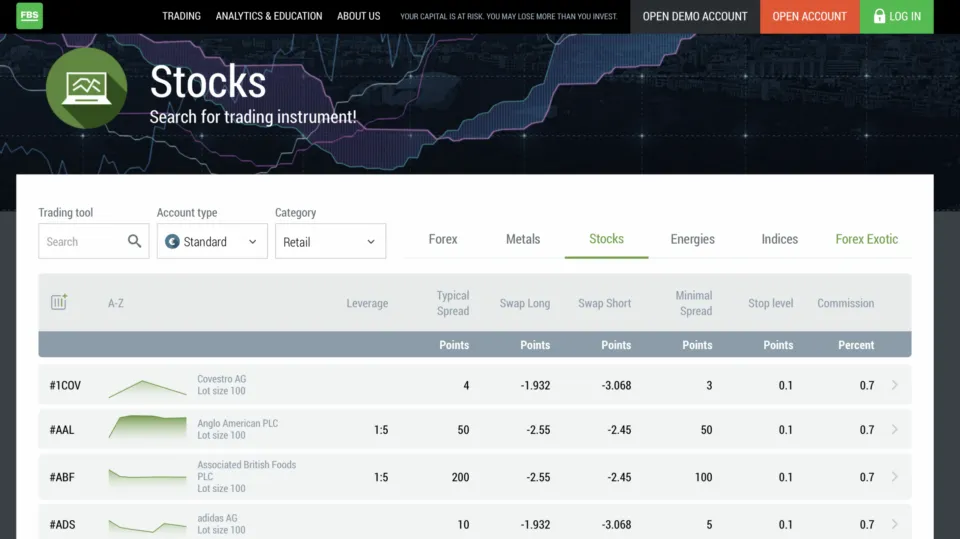
FBS has built a reputation for innovation in trading technology combined with competitive trading conditions. The broker is known for its flexible account options and comprehensive educational programs, something we understand to be attractive to both new and experienced traders.
We value FBS because it offers a range of unique features and trading tools that differentiate it from traditional brokers, with a particular focus on emerging markets and global accessibility.
FBS features:
| Feature | Information |
|---|---|
| Stock CFD Exchanges/Countries | US, UK, Germany, Australia, France, Japan, emerging markets |
| Stock CFD Assets (how many) | Over 2,400 stock CFDs |
| Stock CFD Leverage | Up to 1:3000 |
| Minimum deposit | $1 |
| Spreads from | From 0.0 pips on ECN accounts |
| Commissions | $6 per lot round turn on ECN accounts |
| Trading platforms | MetaTrader 4/5, FBS Trader |
| Copy trading and algo trading | Yes |
| Support | 24/7 |
| Key features | Innovative trading tools, comprehensive education, flexible accounts, over 2,400 stock CFDs |
Important Points We Considered When Choosing The Best Stock CFD Brokers:
Regulation was a prime consideration when choosing stock trading brokers to review, because, as we note below, you’re exposed to counterparty risk when trading CFDs, and you should thus only consider reputable, regulated brokers. All of the listed stock CFD brokers are regulated and aboveboard.
We factored in considerations like trading instruments on offer, account types, spreads, commissions, and available leverage to get a bird’s-eye view of the whole package.
Proficiency in order execution, slippage concerns, available trading platforms, and CFD tools and services (including educational material) contributed to our shortlisting of the brokers mentioned here, too.
Security of traders’ funds and Support services are valid considerations, and all of the stock CFD brokers listed in this article handle clients’ money safely and provide good support.
Taken as a whole, we ranked BlackBull Markets tops because they’re hard to beat on individual points and as a complete trading package.
What Are The Pros And Cons Of Trading Stock CFDs?
Pros:
- Leverage
- Stock access
- Flexibility
- No ownership
- The abundance of market news
- Short selling
Cons:
- Leverage risk
- Complexity
- Volatility
- Risk of overtrading
- Overnight fees
- Counterparty risk.
Pros of trading stock CFDs
There are the main advantages of trading stock CFDs with one of our recommended brokers:
- One of the most significant benefits of stock CFD trading is the ability to access leverage. This allows you to manage larger positions with a much smaller amount of capital, potentially magnifying your profits.
- Stock CFD trading exposes you to a wide range of popular and obscure stocks, giving you a wide variety of trading opportunities, whether you go long or short.
- Trading stock CFDs gives you flexibility in your trading strategies. TrMargin tradingllows you to hold multiple positions simultaneously, increasing your overall market exposure.
- Unlike traditional stock purchases, you won’t take possession of the underlying assets when trading stock CFDs.
- Stock CFD traders arhaveccess to massive market information and accompanying analysis tools; many see stock CFD trading as technical trading at its best.
- You can score when markets rise or fall if you go long or short with stock CFDs.
Cons of trading stock CFDs
On the other hand, there are several things to keep in mind when trading stock CFDs:
- While you can employ leverage when trading stock CFDs to amplify your profits, it can also magnify your losses that exceed your initial investment.
- Stock CFD trading can be very complex for the inexperienced trader. You need to grasp the realities of contract details, margin requirements, and rollover costs.
- Stock CFD markets can prove highly volatile, with sudden price movements in your favour (great) or against you (not so great)-risk management strategies are paramount to offset the excitement of leveraging your way into bulky trades that can wipe out your trading balance.
- Stock CFD trading is bgenerallyaccessible and easy to step into, especially when eyeing a leveraged position, but that comes with the risk of emotional overtrading.·
- Holding a stock CFD position overnight might incur unforeseen costs (swap or rollover fees).
- CFD trades are usually executed via a broker acting as the counterparty to the trade. Although choosing from the reputable brokers we have listed here carries a smnegligibleisk, you remain exposed to the brokerage’s credit risk in stock CFD trading.
What Are Fees When Trading Stock CFDs?
Low spreads are a good starting point, but brokers can charge other fees per trade. You’ll often encounter no or low commissions, where brokers make money on (higher) spreads. Still, the costs of trading stock CFDs might include a commission, sometimes a financing cost, and then the spread (the difference between the bid (purchase) price and the ask (offer) price at the time of your trade).
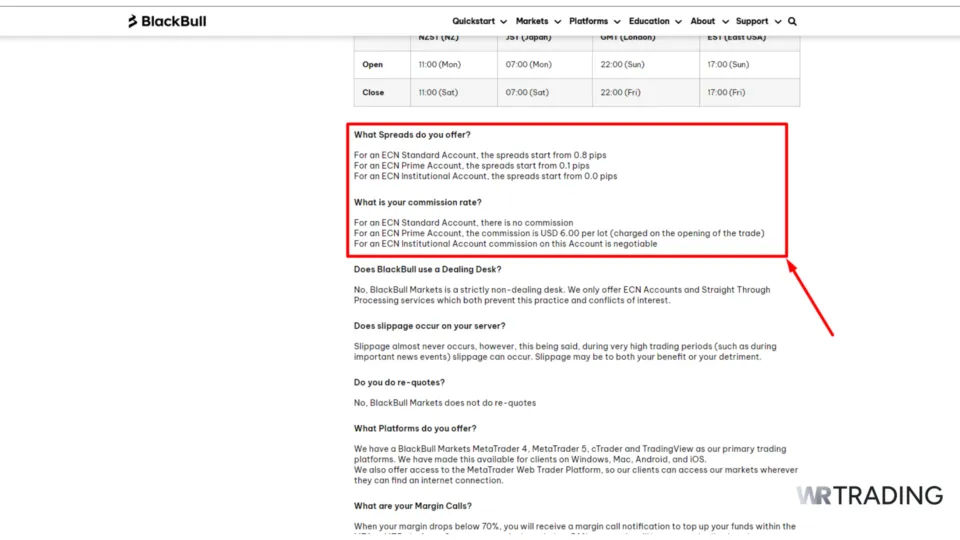
While many other instruments come commission-free, brokers usually charge a commission for stock CFDs. You’ll see commissions listed as dollar sums or percentages (BlackBull Markets, for example, charges a straight $12 for Apple stock CFD trades).
Since your opening and closing trades are deemed separate, you’ll usually be charged a small commission for both “trades” within a trade. Financing charges can come into effect with long positions (because overnight positions are deemed investments and you have utilised leverage-borrowed money-to buy the asset).
You’ll typically be charged interest for every day that you hold your position, and although nominal amounts, they need to be factored into your overall profitability for the trade.
How are Overnight Fees Calculated at a Stock CFD Broker?
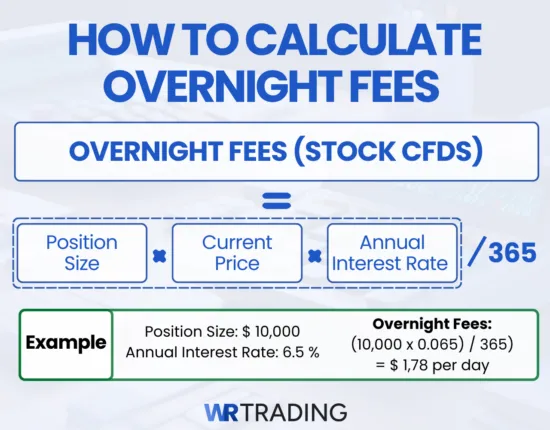
Overnight fees, also known as swap rates or financing costs, are calculated based on the underlying interest rate differential and the broker’s markup. Most brokers use a benchmark rate such as LIBOR or SOFR, then add their own spread typically ranging from 1.5% to 4% annually. The calculation is usually applied daily to positions held overnight, regardless of weekends and holidays.
The formula generally follows:
- Daily Financing Cost = (Position Size × Current Price × Annual Interest Rate) ÷ 365.
- For long positions, you’ll typically pay this cost, while short positions might earn a small credit, though many brokers charge on both sides.
- It’s crucial to understand that these fees compound over time, making longer-term CFD positions increasingly expensive to maintain.
Example Overnight Fee Calculation:
If you hold a $10,000 long position in Apple CFDs overnight with an annual financing rate of 6.5%, your daily cost would be: ($10,000 × 6.5%) ÷ 365 = $1.78 per day.
Over a month, this would accumulate to approximately $53.40 in financing costs.
Example Of A Stock CFD Trade:
Suppose you fancy buying stock CFDs for the current share price of Company ABC, and you place a $10,000 trade.
The current share price of Company ABC is $47.80, and based on your analysis, you expect the share to move to around $51.25, making the bid-offer spread 47.80 – 51.25.
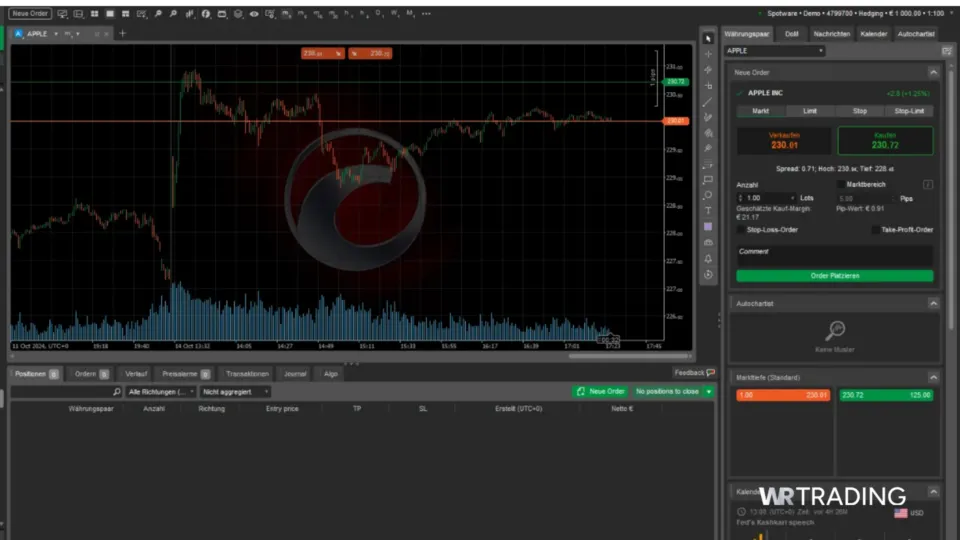
You’ll pay 0.1% commission when opening your position and another 0.1% when closing it. If you take a long position, overnight fees are typically the LIBOR interest rate plus 2.5% or thereabouts.
You buy 209 contracts at $47.80 per share, resulting in a trading position of $9990.20. Let’s say Company ABC’s share price hits your target price of $51.25 in 11 days, meaning the initial value of your trade was $9990.20, and the final value is now $10,711.25.
Your gross profit (before deductions) is:
$10,711.25 – $9990.20 = $721.05
Since your commission was 0.1%, you paid $10 when entering your position. Let’s say interest charges were 7.5% for the duration of your position, payable for each day you held your position (209 × $47.80 × 0.075 ÷ 365 = $2.05). As you held your position for 11 days, the total interest charge will be 11 x $2.05 = $22.55. Now you pay another 0.1% commission fee when closing your trade, i.e. $10.
Your net profit is your gross profit minus charges: $721.05 – $10 (opening commission) – $22.55 (total interest) – $10 (closing commission) = $678.50
Important points
- You must factor in anticipated fees before declaring a profit- you need to know your complete cost per trade to determine legitimate profitability.
- Remember that your initial position is reduced by the spread as soon as you open your trading position, and you’ll thus commence trading showing a loss.
- Brokers’ commission on stock CFD trades is variably based on the value of your trade, the number of contracts you entered, or a fixed rate.
- The longer you hold your position, the higher the overnight costs will be, making this a time-sensitive cost to be monitored carefully.
- Never forget that when trading stock CFDs, you might be subject to a dividend adjustment, an amount either added to or subtracted from your trading account balance. If you’re long and the company pays a dividend, you might gain a dividend payment. Still, you can be charged a dividend adjustment if you sell the stock.
- Lastly, be transparent about any non-trading fees that might apply to you as an account holder with any particular brokerage.
How Much Leverage is Offered for Share CFDs Via the Broker?
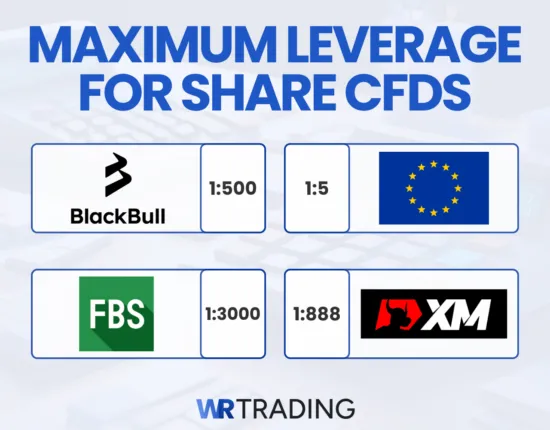
Professional traders and those in less restrictive regulatory environments can access leverage ratios ranging from 1:10 to 1:500 or even higher in some cases. For example, BlackBull Markets offers up to 1:500 leverage, while XM provides up to 1:888, and FBS can offer leverage as high as 1:3000. However, it’s important to note that higher leverage dramatically increases both profit potential and risk exposure.
Leverage offerings for stock CFDs vary significantly among brokers and are heavily influenced by regulatory requirements in different jurisdictions. European brokers operating under ESMA regulations typically offer maximum leverage of 1:5 for major stocks and 1:3 for smaller cap stocks, while brokers in other jurisdictions may offer much higher ratios.
The actual leverage you can access depends on several factors including your location, account classification (retail vs professional), the specific stock being traded, and market volatility conditions. Many brokers also implement dynamic leverage that adjusts based on position size, with larger positions typically receiving lower leverage ratios to manage risk.
Do All CFD Brokers Offer Stocks to Trade?
Not all CFD brokers offer stock CFDs, as some specialize exclusively in forex, commodities, or indices. However, most full-service CFD brokers do include stocks in their offering, though the breadth and depth of available markets can vary dramatically. Some brokers might offer only major US and European stocks, while others provide access to thousands of stocks across multiple global exchanges including emerging markets and smaller cap securities.
How To Trade Share CFDs Via A Broker:
Here is a step-by-step guide to trade stock CFDs at your chosen broker:
- Choose your broker. Select a broker that offers stock CFDs and meets your trading needs.
- Open an account. Complete the registration process and verify your identity.
- Deposit funds. Transfer funds into your trading account using your preferred payment method.
- Download their trading app. If you plan on trading mobilely, install the broker’s trading app on your mobile device.
- Analyse the market. Use the app’s tools to research and analyse stocks you are interested in.
- Place a trade. Select the stock CFD you wish to trade, choose your position size, calculate potential costs, and execute the trade.
- Monitor and manage. Track your trade through the app and make adjustments as needed, paying close attention to overnight charges.
- Close your trade. Close your position when you achieve your desired profit or limit losses.
CFD vs Share Trading – What Is The Difference?
The main difference between CFD and share trading is probably that CFDs allow you to go short (speculating on the share price going down), whereas with shares, you can only go long.
CFDs come with leverage, magnifying your potential profits (or losses) and giving you access to more markets, although obviously, stock CFDs are limited by the stocks traded. Legacy share trading best serves longer-term speculation for intraday and day traders (shorter term).
This doesn’t preclude turning a profit day trading stocks and shares, but as a general rule, stock CFDs are the preferred tool of many pro traders because CFDs enjoy a higher liquidity level.
Another principal difference between CFDs and share trading is that, with CFDs being leveraged, they have a heightened risk of quick losses.
CFDs are more complex than elementary share trading, and while a stock price can see-saw and allow you to exit at a high point and recoup losses, leveraged stock CFDs cost you money daily.
Conclusion
Choosing the right stock CFD broker can impact your trading experience and overall profitability. Do contact WR Trading to learn the ropes and see what best suits your trading approach.
Top stock CFD brokers like BlackBull Markets, Vantage Markets and FP Markets offer robust trading platforms, competitive fees, and strong regulatory oversight.
Highlighting personal preferences for specific app features, fee comparisons, and an analysis of available options (along with educational resources for newcomers) will help you stand out in the pack. Understanding the pros and cons of trading stock CFDs versus traditional share trading can help you make a well-informed choice.
Once again, here is our top list with the best Stock CFD Brokers:
- BlackBull Markets: Known for its competitive spreads, extensive range of assets, and sleek trading tools
- VantageMarkets: Offers low commissions and tight spreads on its RAW account, and a relatively sophisticated app
- FP Markets; Provides a feature-rich trading platform with access to a wide range of markets
- RoboForex: Features low spreads, a user-friendly app that nonetheless has ample sophisticated features for seasoned traders
- Moneta Markets: Combines a smart and intuitive app with innovative trading tools
- StarTrader: Delivers institutional-grade trading technology with competitive pricing and extensive market access.
- PU Prime: Offers premium trading conditions with tight spreads and professional-grade execution.
- VT Markets: Provides comprehensive trading solutions with strong regulatory backing and diverse asset offerings.
- XM: Features user-friendly platforms with educational resources and global market access.
- FBS: Combines competitive trading conditions with innovative tools and extensive market coverage.
Frequently Asked Questions on Stock CFDs:
What is a stock CFD?
A stock (or share) CFD is a financial derivative that allows you to speculate on a stock’s price movement without owning the underlying shares. CFDs will enable you to short a falling market (make money when a share price tumbles).
How does leverage work in CFD trading?
Leverage allows you to control a larger position with a smaller amount of personal capital, as you essentially borrow money at a nominal daily interest rate from the brokerage. While it can amplify your profits, it increases the speed and volume of potential losses.
Are Share CFDs suitable for long-term investing?
Due to their complexity, the leverage involved, and associated risks, CFDS are generally more suited for short-term trading and speculation than long-term investing.
Can I trade on both rising and falling markets with CFDs?
Yes, CFDs allow you to take both long and short positions and profit from rising and falling markets, one of the most attractive features for many traders.
What should I look for in a trading app?
Key features to consider in a trading app include real-time data, charting tools, order execution capabilities, and overall usability. However, personal preferences count; make sure the app you settle on has the features you need to trade comfortably.









